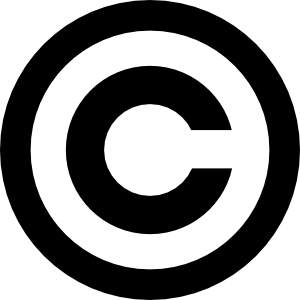A few years ago, I wrote a post on the difference between copyright (literally, the right to copy or reproduce, ownership of which guarantees authors control over their intellectual property) and rights (the bundle of rights contained within copyright, which authors can grant or license to others or exploit on their own).
This week, that post received a (likely spammed) anonymous comment:
Copyright protects works of original authorship such as text, artwork, photographs, sound recordings, screenplays, music, lyrics, etc. You can register more than one work under one copyright registration. Such as a collection of books, songs, photographs, etc. If you need to protect your work you will want to register it for copyright. Visit http://copyrightregistry-online-form.com/ and fill out the form on the site. Your work will be registered same day! In addition, there are representatives available day and night as well as a live chat box right on the website.There's more than a whiff of ripoff here, so I decided to accept the challenge. The link led me to Copyright Registry Online, which promises that
Your U.S. Copyright will be registered in a matter of minutes through our online form submission processing, 256 Bit Encrypted SSL Secure Server. You will receive your copyright documentation in an e-mail and by first class USPS government mail.Well, gee, that sounds nifty (or it might if you didn't know you can easily accomplish the same thing through the US Copyright Office's eCO service). The catch? As if you couldn't guess: the fee. Copyright Registry Online wants you to pay $135 for something that you can do on your own for just $35. If you want to splurge, you can add $25 for "Priority Rush Processing" (completely meaningless, since registration isn't valid until received by the US Copyright Office, which offers no "rush" option) plus $30 for a "Membership Reward Program," which--wow!--grants you a 15% discount on "further copyright submissions."
Copyright Registry Online will also file an infringement claim (a.k.a. a DMCA takedown notice) for you. All you have to do is hand over $99.50. Never mind that you can send a DMCA notice all on your own, for free. Here's how.
I've written before about faux copyright registration services--the kind that "register" you with their own websites, and give you a seal or some other trumped-up certification that's essentially useless for any legal purpose. Unlike these fake services, with Copyright Registry Online and outfits like it you might actually wind up with a genuine copyright registration--but you'd be paying a ridiculous fee to a third party to do what you can easily accomplish yourself for a fraction of the cost.
As with any other writer-targeted scheme, these "services" rely on authors' ignorance and inexperience. Here, therefore, are some resources for learning more about copyright and related issues.
- Writer Beware's Copyright page includes info on copyright, links to resources, and debunking of common copyright myths.
- My blog post on Rights and Copyright untangles the difference between the two, and suggests how to protect yourself when seeking publication.
- The US Copyright Office's Copyright Basics circular provides a lot of information, including how to register your copyright. The USA is unusual in that it has an official registration process (most countries don't) and makes registration a pre-requisite for legal action. Once upon a time, when publishing was just print and grant territories meant something, there really was no need to register in the USA if you weren't publishing there. These days, however, publishing--and especially self-publishing--is global, so it's probably a good idea to register US copyright, even if you yourself are not US-based.
- eCO, the US Copyright Office's online registration service.
- Schedule of fees for registration with the US Copyright Office.
- Copyright registration is important for published work. However (and contrary to much popular belief), there's no need to register copyright for unpublished work. Despite writers' fears (and recent alarming plagiarism incidents), theft is highly unlikely at the submission stage. It's not until a work is exposed to a wide audience (i.e., published) that you need to worry.
- A helpful explanation of the DMCA takedown notice, and how to file one.
- Sample DMCA takedown notices, from the Plagiarism Today blog.
- From the Popehat blog, things to consider before sending a DMCA notice (often, contacting the infringer directly works just as well).

No comments:
Post a Comment